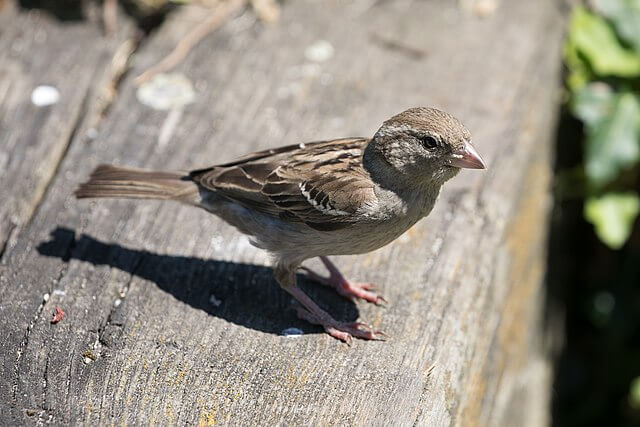
Scientists have attributed the decline in bird populations in the UK and Europe to the extensive use of pesticides and fertilisers in intensive agriculture.
The number of birds flying over the continent has decreased by 550 million compared to a generation ago, and this decline has been primarily linked to intensive agriculture.
A team of over 50 researchers conducted a study using data collected by thousands of citizen scientists from 28 countries over nearly four decades. The researchers found that the overall bird population in Europe has fallen by over a quarter since 1980, but the decline is even more pronounced among species found in farmland, where numbers have dropped by more than half.
Birds that rely on invertebrates for food, including swifts, yellow wagtails and spotted flycatchers, were the hardest hit. “It’s more than a smoking gun,” said Richard Gregory, a senior conservation scientist at the RSPB, and one of the lead authors of the study.
“I don’t think a study has looked at all these factors in one go, in such a sophisticated fashion, correcting for one variable alongside another; and it comes out with a very clear message.”
The study, published in the Proceedings of the National Academy of Sciences, analysed the impact of four major human-induced pressures on 170 bird species: agricultural intensification, changes in forest cover, urbanisation, and the climate crisis. Among these factors, intensive agriculture emerged as the primary driver of the decline in bird populations, as the widespread use of pesticides leads to the depletion of invertebrates, disrupting the food chain.
“The losses are quite huge,” Gregory said. “And a lot of them go back to that kind of an insect diet or linkage with insects, which is suggestive of a link to the way we’re farming land.”
Urbanisation was identified as the second most significant factor affecting bird populations, with cities losing green spaces to development and modern architecture playing a role in reducing suitable habitats.
“We know many of the urban birds – the swifts, the house martins, the house sparrows, the starlings – that live in those environments, that their numbers are declining very strongly, driven we think by the problems in relation to the food supplies, but also house construction and how that’s changing, how the modernisation is removing their natural kind of nest sites in those areas,” Gregory said.
The study also highlighted the impact of the climate crisis, with northern species experiencing a significant decline of 39.7% as temperatures rise across Europe. However, southern species that prefer warmer climates saw a comparatively smaller decline of 17.1%.
The researchers wrote: “Overall, while temperature change can lead to an increase in the distribution and abundance of some species, for those (especially cold dwellers) already affected by other anthropogenic pressures, temperature change constitutes a double burden acting directly on their annual cycle.”
These findings emphasise the urgent need for sustainable agricultural practices that minimise the use of pesticides and fertilisers. Additionally, preserving green spaces in urban areas and implementing conservation measures can help mitigate the negative impact of urbanisation on bird populations. Addressing the effects of the climate crisis is also crucial to protect bird species that are particularly vulnerable to changing temperatures.
By understanding the causes of bird decline and taking appropriate actions, it is possible to reverse the trend and promote the recovery of bird populations in the UK and Europe. Protecting birds not only contributes to biodiversity conservation but also helps maintain the health and balance of ecosystems as a whole.
Only “the rapid implementation of transformative change in European societies, and especially in agricultural reform” could save the continent’s bird populations, the researchers said.
They added: “This paper contributes to the highest political and technical challenge faced by agricultural policy in Europe, struggling to balance high productivity from intensive agricultural practices with environmental protection, and the results are therefore crucial to policymakers, scientists, and the general public concerned with biodiversity and global change issues.”
Their call was echoed by Alice Groom, the RSPB’s head of sustainable land use policy in England. She said: “Increasing our reliance on pesticides and fertiliser has allowed us to farm more intensively and increase output, but, as this study clearly shows, at a huge cost to our wildlife and the health of the environment.
“The UK and devolved governments should ensure agri-environment schemes reward nature-friendly farming practices such as flower-rich margins and herbal leys that are proven to enable farmers to produce good food whilst supporting progressive reductions in the use of pesticides and fertilisers.”
——————————————————————————
At Natural World Fund, we are passionate about stopping the decline in our wildlife.
The declines in our wildlife is shocking and frightening. Without much more support, many of the animals we know and love will continue in their declines towards extinction.
When you help to restore a patch of degraded land through rewilding to forests, meadows, or wetlands, you have a massive impact on the biodiversity at a local level. You give animals a home and food that they otherwise would not have had, and it has a positive snowball effect for the food chain.
We are convinced that this is much better for the UK than growing lots of fast-growing coniferous trees, solely to remove carbon, that don’t actually help our animals to thrive.
This is why we stand for restoring nature in the UK through responsible rewilding. For us, it is the right thing to do. Let’s do what’s right for nature!
Support our work today at https://naturalworldfund.com/ and join in the solution!

